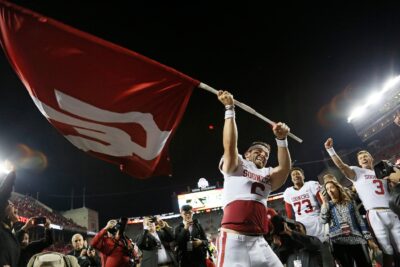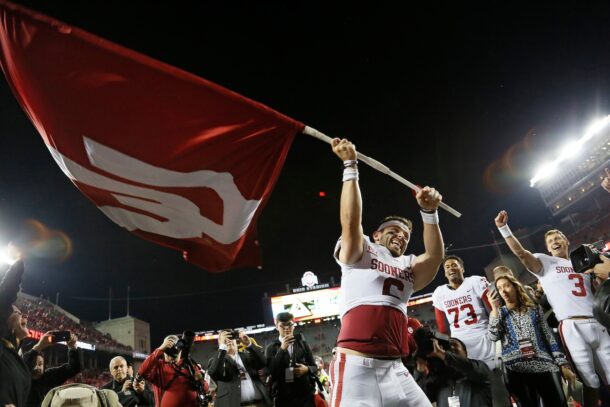Every year a new star is born in college football, seemingly a new nickname comes with him.
This is especially true in the Southeastern Conference. “Honey Badger” became a pop-culture touchstone when Tyrann Mathieu roamed the defensive backfield in Baton Rouge, Louisiana, just a few years ago. Or think back even further to John “Hawksaw” Reynolds at Tennessee in the 1960s.
As good as those two are, we think there are 10 better. In order, they are:
Jevon Kearse — “The Freak,” Florida
The Freak has become a more common nickname in recent years. To a younger generation of sports fans, the moniker belongs to another. Tim Lincecum, before his fall from elite status, was referred to as “The Freak.” But Kearse was the first. How’d he garner the nickname? The 6-foot-4, 215-pounder was projected as a linebacker/safety hybrid entering college. He left the NFL 15 years later as a three-time Pro Bowl selection, an AFC Champion, NFC Champion, college football national champion and first-team All-American.
John Connor — “Terminator,” Kentucky
In a bygone era John Connor would be a household name for a reason other than Edward Furlong. The Buffalo Bills fullback and former Kentucky Wildcats standout shares the same name as the fictional hero from the “Terminator” film series. In the movies the Terminator is the bad guy and John Connor is the good guy. But in real life, John Connor is both a good and bad guy. His nickname fit automatically, but it was his brutal blocking that leveled linebackers and safeties that gave it legitimacy.
Carnell “Cadillac” Williams, Auburn
Carnell Williams held the “Cadillac” nickname since high school. He became famous with it in college. It was handed to him by an Alabama sportscaster, legend says, because of the Caddy’s reputation in the old days of being a step above other automobiles. Williams was that as a running back. When he left Auburn he’d set the school record for most carries and most rushing touchdowns. He spent seven seasons in the NFL, even rushing for more than 1,000 yards his rookie season before injuries stalled his professional career.
“Broadway” Joe Namath, Alabama
Perhaps the most famous nickname on this list belongs to the handsome Pennsylvanian. Namath was known more for his looks than his game. And his game was good. His college coach at Alabama, Paul “Bear” Bryant (speaking of nicknames) called him the most natural athlete he’d ever coached. Namath was fancy and he knew it – thus, “Broadway.” Before the days of constant TV and well before the internet, Namath was a cultural icon who transcended the sport of football. Think Tom Brady, only 40 years prior.
Floyd “Pork Chop” Womack, Mississippi State
For fun alone, “Pork Chop” Womack makes the list. As an offensive lineman at Mississippi State, Womack was largely ignored by the masses. College football diehards knew him and certainly SEC fans did, too. Though by 2000, he was named a second-team All-American and shortly thereafter he spent 11 seasons in the NFL, including seven with the Seattle Seahawks where he won an NFC Championship in 2005.
Anthony “Booger” McFarland, LSU
Few on this list stood out as early and often as McFarland did at LSU. “Booger” was a stalwart from day one, finishing his freshman year with 12 tackles for loss. The next year he was second-team All-SEC and two short years after that he was a first-round draft pick by the Tampa Bay Buccaneers. His colorful personality made him a fan favorite in college and has led to a post-NFL life as a radio host and studio analyst for the SEC Network.
Roland “Champ” Bailey, Georgia
Bonus points to you if you knew “Champ” Bailey’s given first name before reading this. Most Georgia fans did and probably a good number of people Bailey’s age and older. But for those 30 and younger, he’s always just been “Champ.” He was, undoubtedly, the most successful player on this list as he was named a Pro Bowler 12 times, a first-team All-Pro three times, a second-team All-Pro another three and a member of the NFL’s All-Decade team (2000s). That doesn’t even include his time with the Bulldogs. He is as close to an automatic selection for the Hall of Fame as any defensive back in the history of football.
Dulymus “Deuce” McAllister, Ole Miss
“His name isn’t Deuce?” is something you might ask yourself. McAllister helped Ole Miss back to national relevance in the late 1990s. “The Deuce is loose” was almost as common as Mathieu’s catch phrase a good 10 years later. McAllister left Oxford, Mississippi as the only player in school history with at least three seasons of 1,000 all-purpose yards. He is or was the Rebels’ all-time leader in carries, yards, touchdowns and 100-yard games. The Mississippi native spent his pro career in nearby New Orleans where he ran for 1,000 yards in four of his eight season in the NFL – or each season he was fully healthy.
Kenny “The Snake” Stabler, Alabama
When Stabler died earlier this year nearly every football fan, pro or college regardless, tipped their cap. Stabler was an icon both in Tuscaloosa, Alabama and Oakland, California. “The Snake” was edgy and cool in Stabler’s day. His “Run In The Mud” in the 1967 Iron Bowl against Auburn sealed Stabler as a Crimson Tide icon. He finished his NFL career with more interceptions than touchdowns but arguably was just as important to the Raiders fan base, leading the team to a Super Bowl XI win in 1977.
Vincent “Bo” Jackson, Auburn
Walk through the main streets of a small Alabama town where our eldest generation of Americans sit on benches in front of coffee shops. Ask them about the best football player they ever saw. Often you’ll hear the name Bo Jackson. It’s unfair to call Jackson the best that never was. He wasn’t Marcus Dupree. Jackson had his time. It was just too short. He won the Heisman Trophy in 1985 as an Auburn running back. But his pro football career was riddled with injury as he spent only four years in the league, never playing a full season before retiring because of hip problems in 1991. But Jackson was so athletic he spent time in Major League Baseball, too, playing eight seasons there, only four full, and amassing 141 home runs. ESPN once named him the greatest athlete of all-time. And those old-timers still spin the yarns about the Alabama kid.
Eric Bolin is a contributing writer for Saturday Down South. He covers SEC football and Arkansas.







